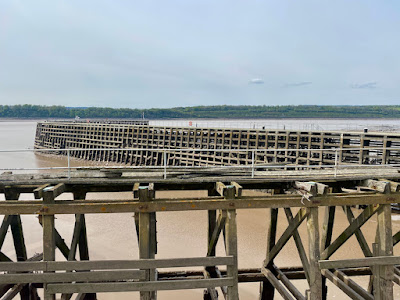Monday, August 1, 2022
Sharpness, Gloucestershire
A port with no sea…but lots of wood
Sharpness is on the River Severn and in the early-19th century was the starting point of a canal that took large ships to Gloucester, then a busy inland port dealing in goods from all over the world. Gloucester’s on the Severn too, but the river is far less easily navigable higher up, hence the need for the canal. Indeed even downstream, the river is not a straightforward one – although wide, it varies greatly in depth and its tidal range is the world’s second largest.
Today, the huge Victorian warehouses at Gloucester docks remain, but they’ve been converted to other uses – a museum, shopping, offices, apartments – because the docks were going into decline from the later part of the 19th century. The main reason for this was that ocean-going ships had become too large to use the canal, but they could sail up the Severn as far as Sharpness. So Sharpness, originally used mainly as the entrance to the canal, became a port in its own right, playing host to ships carrying timber, coal and above all grain.
The two most impressive structures at Sharpness are the two extraordinary wooden piers that stretch out into the river. Seen at the low point in the Severn’s vast tidal range, their remarkable framework of wooden uprights and horizontals can be seen quite clearly, although, when the place is deserted on a Sunday (the best time to get a good view) it’s hard to appreciate their actual scale. The tiny red marks on the top in my photograph are life belts and the pier’s uprights are some 11 metres in length. They are made of greenheart (Ocotea rodiei), a timber of huge density and immense durability, with acid qualities that repel fungi and insects. Some of these timbers are original, from the 1870s, although a programme of repair and replacement keeps the piers in usable condition.
For me these are structures that represent extraordinary construction skill, especially the northern pier, with its gentle curve. Standing by the riverside, near a patch of grass designated as a picnic area, but occupied only by two couples, getting close to one another on benches at the far end, and so quiet not even a gull seemed to be calling, I simply stared. Only Gateshead’s much longer Dunston Staiths rival it in my opinion. Looking at them, one’s first thought is that it’s amazing anything made of wood can last more than a few years in this place of such brutal tides. But of course the piers’ very openwork structure is a hidden strength: the tide runs through it, rather than battering against it. As so often, Victorian builders and engineers knew what they were about, and today’s shipping companies, albeit in smaller numbers now, still benefit.

No comments:
Post a Comment